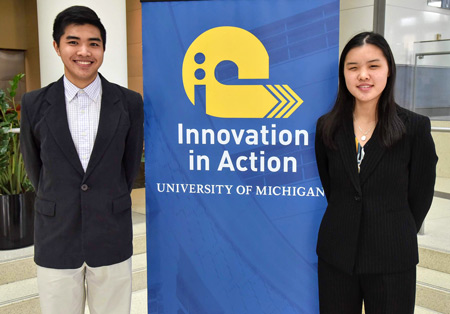Aphasia Advocate: Maxwell Weng
Where: University of Michigan, Computer Science major
What: Vitamin See, a platform that helps people with aphasia communicate using technology
Maxwell Weng just finished his freshman year studying computer science at U-M, but he had more than just homework on his plate this year. In addition to being a student, Maxwell spent the year volunteering at the U-M Aphasia Program (UMAP). He worked with clients and clinicians at UMAP to create a tool to help those with aphasia communicate. His project, a platform called Vitamin See, helps people with aphasia communicate normally over text message and email. Maxwell developed this platform with his sister, Linda, a student at Novi High School.
Maxwell’s dedication to the aphasia community comes from a personal experience with stroke and aphasia. He witnessed his grandmother’s struggle to communicate after multiple strokes and an aphasia diagnosis. He felt powerless to help her.
“Strokes take pieces of us away,” said Maxwell. “My grandmother’s stroke not only took away half of her body, but also her voice. Gone was the grandmother that I had known who had dreamed of reading every single book in the city library, of teaching me how to sauté her famous soy sauce-marinated pork chops, and of attending my college graduation.”
Maxwell visited his grandmother in the hospital often, but their relationship was different now. Despite the different, she remained a central force in his life and she never stopped working toward recovery.
“She never accepted her physical and speech deficits as permanent disabilities,” he said. “I always went into my grandmother’s hospital room to provide hope, yet I always left deeply moved by her bravery and her will.”
He was inspired to learn to code in order to help his grandmother communicate. He took advantage of “free online courses, classes at a local community college, Stack Overflow, Google searches, and countless sleepless nights,” in order to achieve his goal. This October he was able to complete the Vitamin See project and realize his dream of helping people with aphasia communicate with their loved ones, caregivers, and clinicians.
When Maxwell arrived at U-M he contacted UMAP because he wanted to collaborate with our intensive and innovative program. Our clients and clinicians have spent many hours working with Maxwell on his project to empower and support the communication needs of people with aphasia.
Vitamin See won second place in the U-M School of Public Health Innovation in Action competition, which rewards students for finding solutions to real-world challenges. His work with the stroke and aphasia communities makes him a true Aphasia Advocate!
We are looking forward to continuing our work with Maxwell in the fall semester as he continues to refine Vitamin See. Maxwell said he plans to research not only how to develop more effective speech therapy practice tools, but to also find a way to expand their reach to help people with aphasia across the world. UMAP clinicians will continue to provide expertise to help make Vitamin See as effective as possible. UMAP clients and their care partners will also provide valuable input based on their experiences, and continue to benefit from the communication support the program provides.

